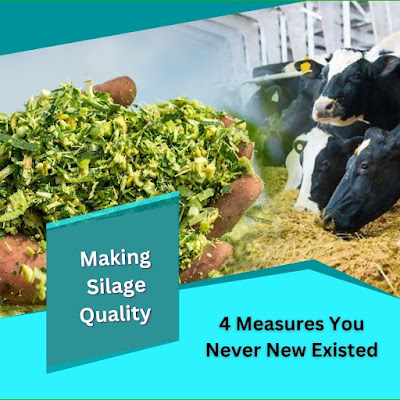Characteristics of good silage
Silages
are the most common feeds used for the dairy cattle. Their never-ending
benefits have made them the first choice of dairy farmers. Silages are
considered as a rocket fuel for cows which increases cattle milk production.
But
it should be noticed that silage is not passive feed. Its dynamic nature can
make change in the nutritional value with the time. Before purchasing silage for animals,we should possess knowledge about them.
Below
mentioned are characteristics of good
silage -
1. Color
Color
of silage can indicate potential fermentation problems. Generally, we say it as
a green fodder. Right color of silage is said to be yellowish or greenish.
Dark
brown or black color silages are damaged due to high temperature and they harm
the milk productivity of dairy cattle.
Silages
with yellow color have extra acetic acid and those with green color consists high
amount of butyrate.
2. Aroma
Like
we judge leftover food on the basis of odor, silages can also be evaluated with
their aroma. Acids are the reasons of their bad smell or fragrance. Low or no
use of acids will give silages a pleasant fruity smell.Punjab Silage Company ensures use of no acids in the fermentation
process.
Silages
which ferment normally have slightly sweet smell due to low use of lactic
acids. Those which are fermented with high acetic, ethanol content may give
alcoholic or sharp chemical smell to them. Dark color silages have tobacco like
smell.
3. Taste
Use
of sugar, butyric acid, lactic acids, ammonia and other elements impacts taste
of silage. Silages with high sugar content give a high level of taste to
cattle. If high ammonia and mold are used in the fermentation process then it
will give silage a bad taste.
Taste
is an important factor. Poor or rotten taste silage is mostly rejected by the
cow and can’t result in increase cow
milk production. Contact best silage providers in India.
4. Texture
Source
of fibers regulate the texture of silage. Corn silage has smooth texture as compared to others.
Less smooth texture of silage indicates that they are made from elephant grass
or rice straws which are not good for our dairy cattle.
Best corn silage providers in India can contact us free flowing and non-sticky
textures.
5. Ph level
Ph level is used to identify the acidity or alkalinity of a solution. Right ph level of silages is considered to be around 3.8-4.5.
Increased in the number ph level will tell us excess use of ammonia and lactic
acid in the fermentation process. Such types of silages are hard to store.
It’s
better to be safe than sorry. These above-mentioned qualities will surely help
us to identify the best silage for cows.
Before purchasing silage evaluate all the characteristics to minimize milk
production and decrease health problem.
Still
confused between hay and silage for your cows? Know why silage is superior for dairy cattle.


Comments
Post a Comment